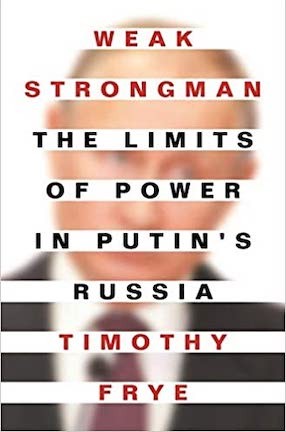Is Vladimir Putin as Powerful as the West Thinks?
In his new book, Weak Strongman, Timothy Frye argues that contrary to popular belief, Vladimir Putin is not omnipotent.
Vladimir Putin has long been the bogeyman in the minds of Americans. Western media outlets often portray him as an authoritarian ruler who has no qualms in making his critics and opponents disappear. But, are there constraints on his power? In his new book, Weak Strongman: The Limits of Power in Putin's Russia, Timothy Frye, the Marshall D. Shulman Professor of Post-Soviet Foreign Policy in the political science department, reveals a more nuanced view of Putin and political power struggles in Russia.
Columbia News caught up with Frye to find out what led him to write this book, how influential is Alexei Navalny (alive or dead), and what sports stars he’d invite to an imaginary dinner party.
Q: What inspired you to write this book now?
A: I’ve been studying Russia for more than 30 years and grew tired of seeing the rich politics of the country often reduced in our public debate to cliches about Putin’s KGB background or Russia’s autocratic past. With our democracy under threat and global autocracy on the rise, I saw an opportunity. I wrote an explainer book about Russian politics that draws on recent social science research by a new generation of Russian and American scholars that has received little attention outside of academia to help us understand the moment. For all its problems, Russia has been a great place to study autocracy.

I also included many personal anecdotes of my misadventures in Russia from working on a cultural exchange in the Soviet Union in the late 1980s to co-running a research institute in Moscow for the last decade. These anecdotes—from being the inadvertent target of a honeytrap in 1988, to watching the Twin Towers fall from Moscow in 2001—provide insights that are hard to come by without spending a lot of time in the country.
Q: Many in the United States see Putin as an omnipotent leader, but your book argues that while he is an authoritarian ruler, his power is limited. How is this possible?
A: Putin faces no serious challengers, but he is not all-powerful. To consolidate his power, he has weakened the courts, the parliament, and the bureaucracy, but rulers also need these institutions to govern well. He rules over a well-educated populace using a corrupt and unruly bureaucracy in a country of 11 time zones and relies on a mixture of performance, popularity, propaganda, and repression to stay in power. Just ordering people around doesn’t get him very far.
Like all autocrats, he faces the dual threats of an elite coup and a mass revolt, and these two threats can rarely be addressed at the same time. As a result, he faces hard tradeoffs. Manipulate the media, but not so much that people distrust the source. Cheat too little on elections and lose office, but cheat too much and lose legitimacy. Repress political opponents, but do not spark a backlash. Use corruption to reward your cronies, but avoid economic stagnation that would make you unpopular. Strengthen the security services, but not so much that they turn on you. Far from being all powerful, Putin faces many constraints that confront all autocrats.
Q: The Biden administration seems to be handling our relationship with Putin and Russia differently from the previous one. How is Putin reacting to this renewed tension with the United States?
A: Russia’s relations with the U.S. are at a low point. At home, Putin tries to use anti-Westernism to shift blame for Russia’s problems, and this has pleased some hard-liners among the elite, but the Russian public has been skeptical of this narrative. Putin and Biden are likely to meet in June, but at this point, merely preventing a deterioration of the relationship would be a success.
Q: Do you think opposition leader Alexei Navalny (alive or dead) poses a threat to Putin’s rule?
Navalny has been a singularly successful opposition figure in Russia over the last decade and this has made him a target. Removing Navalny from the political scene, though, won’t solve the problems that produced Navalny in the first place. It won’t raise living standards, reduce corruption, or increase trust in government and will likely exacerbate the problems.
Q: Now that you’ve finished writing your book, hopefully you have some time to read for pleasure. What books are on your reading list and why?
A: Novels and short stories have gotten me through the pandemic. I delved back into classics like Vasily Grossman’s Life and Fate, Sergei Dovlatov’s The Suitcase, and John Williams’ Stoner. I have also been reading Chekhov short stories with my son who is 13. Chekhov is my favorite. I just finished Min Jin Lee’s Pachinko about Korean immigrant life in Japan in the 20th century. It has the historical sweep of a Tolstoy novel but takes place in a setting that was new to me. Now I’m reading Keith Gessen’s A Terrible Country.
Q: You are hosting a small dinner party. Assuming everyone is fully vaccinated, which three scholars, celebrities, despots, or artists, dead or alive, would you invite and why?
A: I’m a huge sports fan, and I enjoy listening to athletes who can talk about the mysteries of their craft or about the intersection of sports and politics. I would invite George Popovich, the basketball coach of the San Antonio Spurs who is thoughtful on political issues, a wine connoisseur, and a former Soviet studies major by the way. Next would come Naomi Osaka who embodies a new kind of global sports icon and has a killer instinct on the courts. And finally. I’d invite my father who was a great athlete at Princeton in the 1950s and would love the conversation.
Check out Books to learn more about publications by Columbia professors.